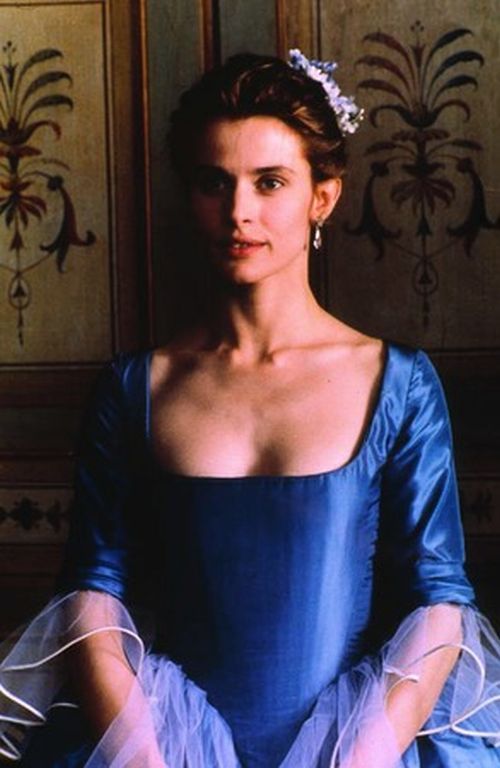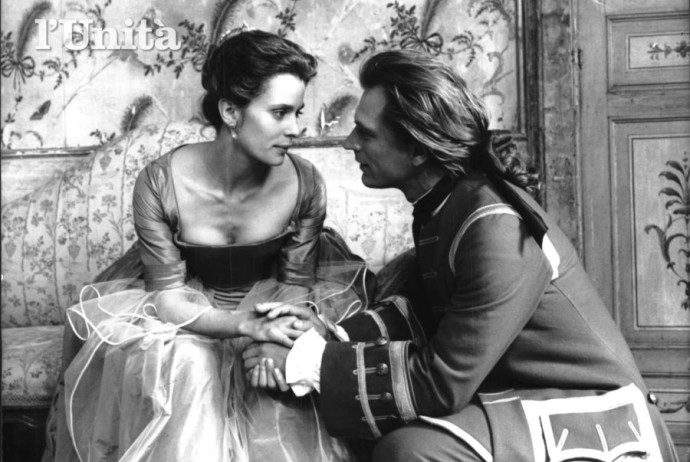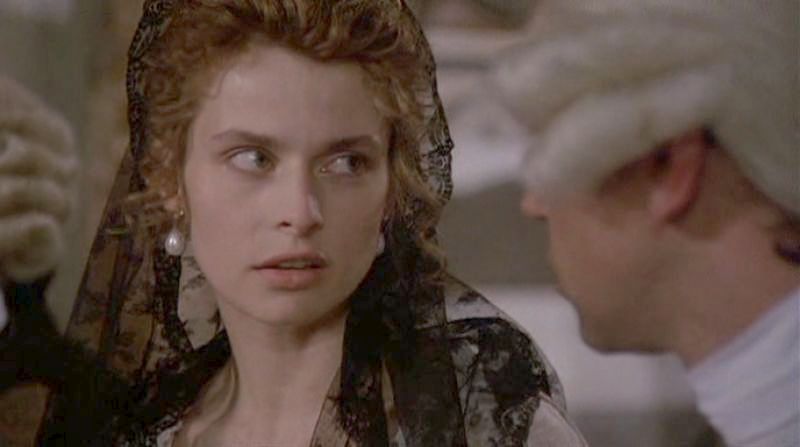Dir: Paolo/Vittorio Taviani
Star: Julian Sands. Charlotte Gainsbourg, Massimo Bonetti, Nastassja Kinski
a.k.a. Night Sun
While separated by more than a century and half a continent in their settings, there are some interestingly similar resonances with Tess here. In both cases, we have a couple, engaged to be married across a class divide. However, a dalliance in the woman’s past derails the matrimony – though there’s more than a whiff of societal double-standard, with the man no less guilty of the same sort of thing. Still, stunned by the revelation, he abandons the woman in search of happiness and fulfillment elsewhere – only to discover he might well have been better off showing some more tolerance.
Of course, it’s certainly not an exact parallel. The class divide here goes the other way, with promising but low-born young soldier Sergio Giuramondo (Sands) getting an arranged marriage to the noble Cristina Del Carpio (Kinski) for career purposes, at the behest of the king. And, in this case, there wasn’t any rape or coercion involved: Cristina and the king were actually lovers for a year, which is why she’s willing to consider Sergio as a match and marry below her station. Her fiancé is so upset by the revelation, he enters the priesthood (rather than heading for the colonies like Angel Clare), only to find himself the clerical equivalent of a zoo exhibit, a soldier turned priest trotted out for the amusement of his former colleagues.
 Realizing it’s not the escape for which he hoped, Sergio takes the place of a hermit in a remote hovel, only to find neither the rest of the world still unwilling to leave him alone. Another aristocratic woman shows up in on his doorstep in the middle of a rainstorm, and attempts to seduce him – his resistance involves an axe and a body-part, shall we say. Sergio also is credited with restoring the power of speech to a brigand’s son, and When word of that miracle gets out, any hope he might have for a peaceful life pretty much gets up and leaves. The church moves to take advantage of its newest religious superstar, and it’s not long before there is a constant stream of supplicants awaiting his blessing – it’s a religious groupie (for want of a better phrase) that eventually proves Sergio’s downfall.
Realizing it’s not the escape for which he hoped, Sergio takes the place of a hermit in a remote hovel, only to find neither the rest of the world still unwilling to leave him alone. Another aristocratic woman shows up in on his doorstep in the middle of a rainstorm, and attempts to seduce him – his resistance involves an axe and a body-part, shall we say. Sergio also is credited with restoring the power of speech to a brigand’s son, and When word of that miracle gets out, any hope he might have for a peaceful life pretty much gets up and leaves. The church moves to take advantage of its newest religious superstar, and it’s not long before there is a constant stream of supplicants awaiting his blessing – it’s a religious groupie (for want of a better phrase) that eventually proves Sergio’s downfall.
Kinski doesn’t get much more than a couple of scenes here, but they are pivotal, setting the hero on his path to solitude. When we first see Cristina and Sergio, they’re preparing for their marriage, scheduled to take place the following day. While he confesses to having originally approached her out of self-interest, saying “I was thinking of my career… I wanted to be part of the aristocratic society that excluded me,” he has now genuinely fallen for her, saying “How paltry all that seems next to you.” Their conversation is interrupted by her being requested to sing, but the audience’s attention in turn is stolen by the arrival of a gift from the king: a pair of mechanical birds in a cage. It’s this which triggers Cristina’s confession of her affair with the monarch, telling Sergio, “Everyone knew about it. That’s the only reason my family accepted you.” He leaves without another word, and we never see her again, though at times it seems every other woman he encounters, is an echo of his first true love.
In this area, I note particularly the presence of Charlotte Gainsbourg, who doesn’t just resemble Kinski, but was also the offspring of a notorious European father. In her case, Dad was a one-time lover of Brigitte Bardot, Serge Gainsbourg – of particular resonance, I note rumblings that have surrounded the Gainsbourgs ever since they released a song called Lemon Incest when she was 12. That aside, the rest of the film is largely Sands’ to carry, and I’m fine with that. I’ve enjoyed his performances in a wide ranges of films, even cheerful B-movies like Warlock, and he gives the film here a spiritual center that’s extremely solid. I can’t say I’ve seen any other of the Taviani brothers’ films, but on the evidence of this, they would seem worth checking out: they and cinematographer Giuseppe Lanci have an eye for the pastoral landscapes which, again, is reminiscent of Tess. Particular praise here should also go to composer Nicola Piovani, who seems to be a frequent collaborator with the Tavianis, and whose soundtrack here provides an excellent companion to the storyline.
Like Torrents of Spring, this is based on a work of late 19th-century Russian literature, in this case, Leo Tolstoy’s Father Sergius, although the hero in the original short story was a prince himself, rather than a career soldier. As with Torrents, I do have an issue with the ending, which sees the hero do not much more than exit, stage left, without any true sense of resolution. However, it works rather better here, as Sergio returns to his roots, and appears to discover that that the true secret of happiness is simply wanting what you have, rather than yearning or striving for some idealized existence, that can never be achieved. It’s quite poignant, in particular that Sergio has to go through so much pain, both emotional and physical, to come to the realization that the happiness he sought was probably to be found with the woman he abandoned, in pursuit of an apparently mythical Nirvana.


This movie put me to sleep! It needed more Nastassija and less Julian Sands